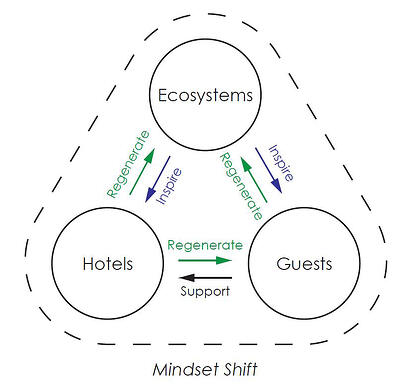Regenerative Hospitality - a new sustainability paradigm on the rise
Co-authored by Sarah Balet, MSc Economic collaborator at the University of Applied Sciences and Arts of Western Switzerland Valais and Roland Schegg, PhD Professor at the University of Applied Sciences and Arts of Western Switzerland Valais

There is no time to waste. Let us rethink and reinvent tourism, and together, deliver a more sustainable, prosperous and resilient future for all. UN Secretary-General António Guterres’s message for the World Tourism Day “Rethinking Tourism”, New York, 27th September 2022.
The statement is clear. The tourism industry needs to go one step further in order to make a significant contribution to building a sustainable future. Yet, many have criticized the current inadequacy of the final objective - respecting the Paris Climate Agreement - and the actual paradigms of the industry, such as unlimited growth and the global distribution of tourism (Becken, 2019). Thus, the call from the UN Secretary-General António Guterres to rethink and reinvent the tourism industry raises concerns about the effectiveness of sustainability to meet that objective.
Regenerative is the new corporate sustainability
During the past decades, corporate sustainability has been seen as the solution for businesses to tackle the challenges of our modern society and to create a more sustainable world (Montiel & Delgado-Ceballos, 2014). However, many scholars and practitioners have pointed out the limitations inherent to this approach, citing the inappropriateness of the current business models to address the four dimensions of sustainability: human, social, economic and environmental (Lozano et al., 2015) - as business models are still designed with a too large focus on monetary profit (Hahn & Figge, 2011).
Business models need to be reshaped to fully embrace sustainability (Hahn & Figge, 2011; Lozano et al., 2015) and examples documented in the tourism industry are no exception (Bellato et al., 2022; Dwyer, 2018). Small efforts, such as reuse towel policies, are not sufficient. Only systemic changes will allow actors of the tourism industry to really take into consideration the ecological and social limits of living on a finite planet (Becken, 2019; Higgins-Desbiolles, 2018)
As a response to those limits, a new approach to tackle the challenges of our modern society has arisen: 'Regenerative Tourism'. Regenerative tourism can be defined as a new paradigm that is “a transformational approach that aims to fulfil the potential of tourism places to flourish and create net positive effects through increasing the regenerative capacity of human societies and ecosystems […]” (Bellato et al., 2022, p. 9). In other words, rather than trying to be net zero by implementing sustainable practices, which consists in balancing out negative impact with positive practices, businesses that put in place a regenerative approach aim to be net positive by giving back more to the people and planet than what is being consumed to operate the business.
Regenerative Hospitality - a new paradigm
Professor Alessandro Inversini from EHL Hospitality Business School and Professor Roland Schegg from the University of Applied Sciences and Arts of Western Switzerland Valais (HES-SO Valais) received funds from the HES-SO in the context of a call for strategic project 2022 from the field of Economy and Services. These funds have been used to explore how the regenerative tourism approach can be implemented in the hospitality industry. The project was done in collaboration with Amanda Ho, co-founder & CEO at Regenerative Travel, a travel agency that inventories hotels that actively practice regenerative hospitality.
The research team has created a framework summarizing how regenerative hospitality is practiced and envisioned, based on interviews from hoteliers, researchers and entrepreneurs. While the results are still preliminary, a four-step approach on how to implement a regenerative hospitality framework is presented below:
1. Adopt the right mindset to practice regenerative hospitality
At the basis of regenerative hospitality, there must be a shift of mindset, as explained by one of the interviewed travel agents: We really believe that one of the most important things is the owner’s mindset […], regeneration starts within yourself and you have to have that mentality to want to give that back to the world and to make the planet better.
Hoteliers need to give up on the pure profit-oriented business models and the pseudo-sustainable profit-oriented ones. Without such a mind shift, a regenerative approach cannot be implemented.
2. Build an ecosystem business model
A hotel practicing regenerative hospitality must not disrupt local ecosystems. It needs to be embedded in the place where it is located. Thus, its purpose is not to soak up local resources for the profit of shareholders located miles away. Rather, it should understand how the place where it is located works.
The place is made of several ecosystems that co-evolve, such as the local communities, economy and natural environment. Only once a hotelier has a clear vision of how those ecosystems interact and sustain each other will they be able to come up with a business model that fits and becomes part of those ecosystems. Indeed, co-creation with the place is at the root of regenerative hospitality. This means applying a sincere bottom-up approach that starts from local ecosystems. Therefore, before starting to operate a hotel in a new location, hoteliers should not only involve local communities, but also build on their knowledge to create a hotel that will meet the needs of the place. This can be explained with an example by one of the researchers interviewed: They designed that hotel with the village in mind […]. They saw themselves as an integral part of that community and looked at what's the potential of that place that they can help grow?
3. Commit to the local stakeholders and regenerate their ecosystems
Although hotels need financial support from guests, a regenerative approach is not profit-oriented. Actually, giving back to its ecosystems is just as important as being financially independent. In order to create a net-positive impact on the ecosystems, hoteliers need to care about the well-being of the local communities, the hotel’s surrounding environment and its employees. Thus, it holds responsibility towards the well-being of its stakeholders and needs to go beyond reducing the negative impact of the business activities on them. This has been stated by one of the researchers interviewed: We are not throwing profit out the window at all because profit is a measurement of the vitality of a business. But how can I develop the health and vitality of my business, by providing benefit and well-being to the community I'm in.
4. Involve guests in the regeneration process
While a regenerative hotel operates in harmony with the local place, it also needs to ensure that the guest experience is regenerative. There are two ways the hotel can play that role. First, by educating guests and offering them activities to regenerate the place and get inspired by it, such as helping to restore coral reefs. Second, the guests can regenerate themselves by having the opportunity to take part in an experience that relieves the stress of our modern lives. One hotelier described their hotel experience as Showing people that you can live a bit slower, a bit different, and it's not necessary to follow this crazy busy life that is very often disrespectful to nature.
A virtuous circle
By following these four steps, regenerative hoteliers can create a virtuous circle that benefits and sustains local ecosystems, as well as provide a better future locally than corporate sustainability would. Regenerative hospitality has the potential to be the solution for hoteliers who are working on making the world a better place through their business activities.
EHL Hospitality Business School
Communications Department
+41 21 785 1354
EHL





